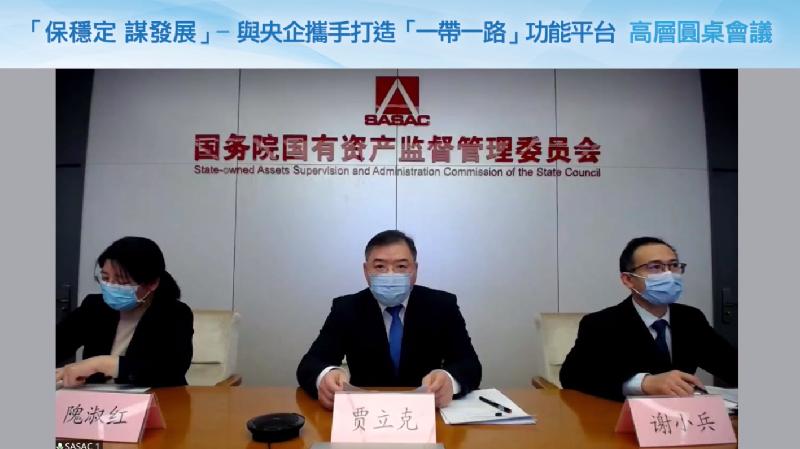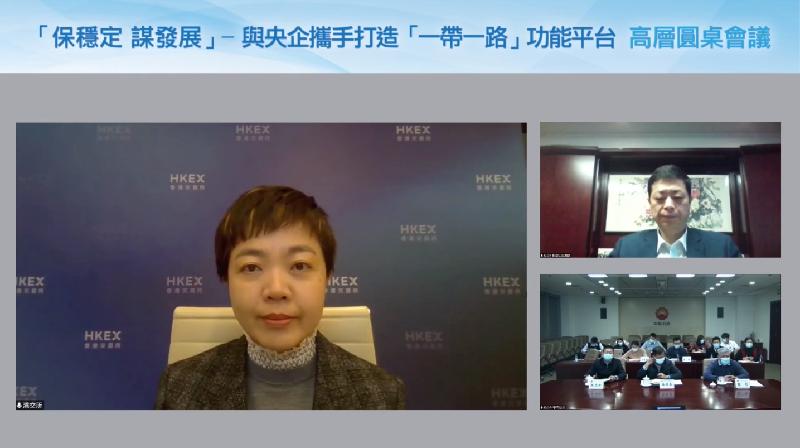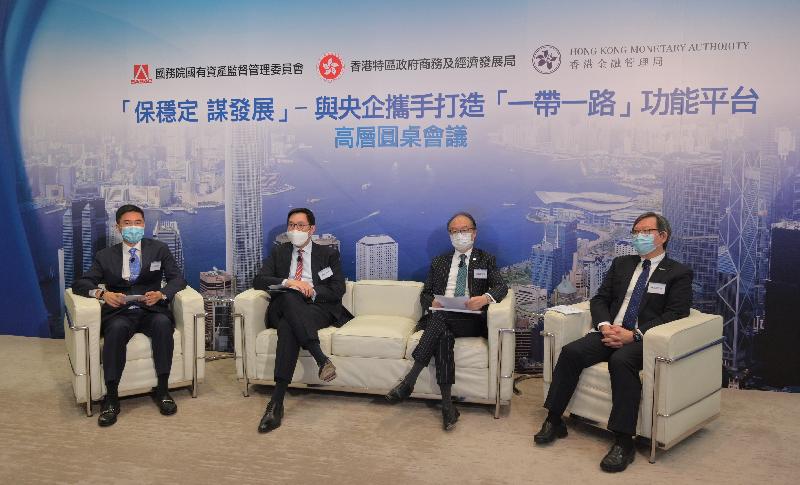HKSAR Government and SASAC jointly organise Belt and Road high-level roundtable (with photos)
The Commerce and Economic Development Bureau (CEDB), the State-owned Assets Supervision and Administration Commission of the State Council (SASAC) and the Hong Kong Monetary Authority (HKMA) jointly organised a high-level roundtable on "Fostering Hong Kong as Belt and Road Functional Platform together with State-owned Enterprises" today (January 8). The roundtable in an online format was joined by more than 100 representatives from 25 state-owned enterprises (SoEs), with close to 100 relevant enterprises or members from more than 10 professional services bodies and institutions in Hong Kong viewing it online.
The roundtable sought to promote exchanges and co-operation between SoEs and Hong Kong's business and professional services sector (including investment and financing) to leverage Hong Kong's strengths and bring about complimentary advantages. With that, it was hoped that the competitiveness and the standard of participation under the Belt and Road Initiative could be raised for both sides, thereby bringing forth high-standard and sustainable development and enhancing integration into the overall development of the country.
The Director-General of the Bureau of Property Right Management of the SASAC, Mr Jia Like, and the Secretary for Commerce and Economic Development, Mr Edward Yau, addressed the audience at the roundtable. The Chief Executive of the Hong Kong Monetary Authority, Mr Eddie Yue, and the Managing Director, Deputy Head of Market Development and Head of Global Issuer Services of the Hong Kong Exchanges and Clearing Limited, Ms Christina Bao, outlined the current status and prospects of Hong Kong as an international financial centre and shed light on how SoEs can utilise Hong Kong's capital market to drive development, respectively.
Mr Yau said at the roundtable that Hong Kong, as a comprehensive functional platform for the Belt and Road Initiative, is best placed to support SoEs in their Belt and Road projects by making the most of the city's strengths. Hong Kong's soft power on the financial, legal, management and other fronts could go hand-in-hand with the tangible strengths of SoEs. The country is fostering a development pattern with the domestic circulation serving as the mainstay, and with the domestic and international circulations mutually reinforcing each other. With this backdrop, enterprises were bound to attach more importance to internal system reforms, strategic restructuring and professional consolidation. They would also strengthen collaborative innovation to boost the quality and efficiency of their properties and projects, which would help enhance their core competitiveness in a comprehensive manner and expand the room for high-standard development. As the prime functional platform for the Belt and Road Initiative, Hong Kong could support SoEs in such areas as investment and financing, logistics as well as commerce and trade, etc, by capitalising on the city's extensive international networks, and strengths in the professional services and application of innovation and technology. They would be supported to optimise their modern corporate system and management models to better respond to risks and grasp the opportunities ahead with enhanced competitiveness.
Citing that the epidemic had led to a new landscape in the international economic and trade arena as well as a "new normalcy" in the community, Mr Yau emphasised that cohesion and co-operation of the international community, including the Belt and Road-related countries and region was important to controlling the epidemic and relaunching the economy. Collaboration among SoEs, Hong Kong's businesses and its professional services sector would provide greater strengths in contributing to the Belt and Road Initiative and create opportunities for advancing development. He urged enterprises of both places and Hong Kong's professional services sector to join hands to overcome the challenges and seize the new opportunities brought by the epidemic. They are also called upon to actively explore the growing Mainland market under the new landscape and the "new normalcy" with modern, professional and innovative vision, promote Belt and Road collaboration and orderly economic recovery as well as identify new growth areas of sustainable development.
The Commissioner for Belt and Road, Mr Denis Yip, moderated a discussion session at the roundtable, which was joined by the Chairman of the Financial Services Development Council, Mr Laurence Li; the Immediate Past President of the Hong Kong Institute of Certified Public Accountants, Mr Johnson Kong; and the Chairman of the Hong Kong Productivity Council, Mr Willy Lin. They discussed how SoEs could promote the sustainable development of Belt and Road projects with Hong Kong's professional services sector. They also shared Hong Kong's experiences and relevant international principles in strengthening modern corporate governance by engaging professional services. The session also included a discussion on smart production and innovative technology as a means of raising resilience and competitiveness to pave the way for continuous development in post-epidemic times.
The SASAC has all along rendered strong support to the Hong Kong Special Administrative Region on its Belt and Road related work, including co-organising various sharing sessions of different themes in conjunction with the Belt and Road Office of the CEDB since 2018, with a view to building interactive exchange platforms for Hong Kong's businesses and professional services sector, as well as for SoEs and other Mainland enterprises.




